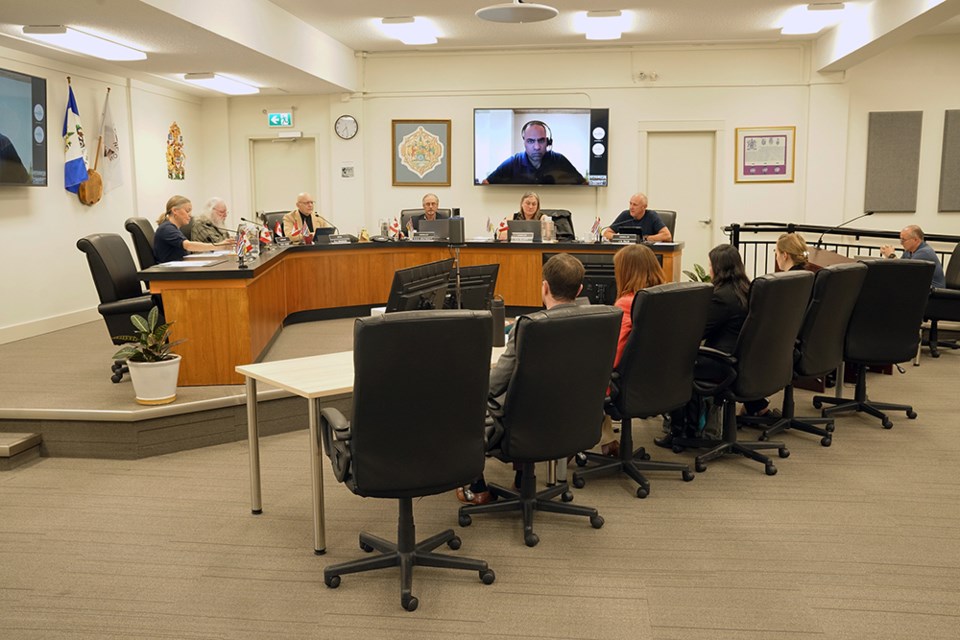With an unruly gallery making conversation difficult, City of Powell River councillors passed a motion to continue participating in government-to-government-to-government forums.
At one point in the April 18 city council meeting, mayor Ron Woznow called for a recess when noisy comments from the crowd disrupted the debate on whether and how to participate in what is known as C3 meetings between the city, Tla’amin Nation and qathet Regional District. During debate, Woznow asked the audience several times to allow councillors to have a conversation.
When councillor Jim Palm questioned councillor Trina Isakson on whether she ran for election on an open and transparent agenda, several councillors called a point of order and Woznow called for a five-minute break to restore order.
The debate began with Isakson reading a motion she had brought forward that council participate in C3 forums and other government-to-government-to government forums as relationship building, information sharing, and in cases where discussions that advance decision making among member governments are required, that those discussions are made in the duly-called meetings of city council, observing two sections of the Community Charter that govern open and closed meetings.
Isakson said the intention of the motion is to affirm council’s willingness to participate in C3 forums.
“They have traditionally been held on a regular basis and it’s time to get back to them,” said Isakson. “It’s in the interest of our community to have good intergovernmental relations with the other two major local governments in our region. This provides clear direction to the other parties that we are willing, and also provides clear direction to staff to work with staff members from the other bodies to help organize these for us.
“It’s strategic and important for those relationships to be good. This outlines the ways in which we can meet and that those meetings are in line with the Community Charter.”
Palm said in regard to the Community Charter, which council needs to abide by, C3 meetings, which are being asked to be behind closed doors, are not legal, so he would not support the motion.
“We are breaking the law to do so,” said Palm. “We have sent requests through the Union of British Columbia Municipalities (UBCM) for the government to amend section 90 of the Community Charter to allow us to have meetings and we have not heard back from the provincial government on this matter.”
Palm said council should be following the lead of the province.
Important relationships
Councillor George Doubt said he has read that relationships between a city and First Nations are important to the well-being of the community and the economic development of the city.
“It’s a goal that most municipalities are trying to achieve,” said Doubt. “I was at the Association of Vancouver Island and Coastal Communities (AVICC) convention last week. The minister of municipal affairs was there speaking about the importance of relationships with First Nations and neighbouring communities, and directly answering that they had no particular direction to give to municipalities about exactly how they hold meetings, because they didn’t have any prescription to do it.
“We have a letter from the province in response to a UBCM motion we’ve made that said: ‘Go ahead and do the best you can and let us know how you succeed and we’ll let you know if it fits.’”
Doubt said he supported the motion and that it was an important keystone in keeping good relations in the community and getting everyone working together, as opposed to working against each other.
Councillor Cindy Elliott said she disagreed that it was illegal to go in camera with any group of people and said there are provisions in the charter for doing so.
“I want to find ways to enable conversations between local First Nations and us,” said Elliott. “I don’t want to find ways to stop it. We need to find protocols that keep us safe and within the law and make sure we are being as transparent as we can, while still respecting that our neighbours don’t have the same rules we do. We need to get into the room and start talking. That’s what is in the best interest of all of us.”
Councillor Rob Southcott said it is important to get the relationship with Tla’amin working again, so he supported the motion.
Woznow said the motion was much to do about nothing. He said he first met with Tla’amin in 1990 and has dealt with at least 20 First Nations communities across Canada.
“We have offered to break bread with Tla’amin Nation,” said Woznow. “They have indicated this is not an appropriate time for them. Over the past 16 months, I’ve had a standing invitation to break bread with hegus John Hackett. That has never been accepted on his behalf.
“We, as a council, have repeatedly talked about the importance of this relationship, and besides just talking, we have put out formal requests to meet. The issue is simple. When our First Nations partners are ready to communicate with us, they will let us know and we will have open communication with them.”
Council carried the motion, with Palm opposed.
Join the Peak's email list for the top headlines right in your inbox Monday to Friday.



